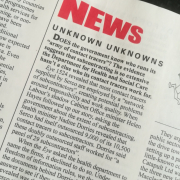Covid Tests Failure – More Questions About Pandemic Procurement
Another UK pandemic-related supplier appointed in haste without competition (and perhaps without proper due diligence) appears to have failed in performance terms.
Immensa Health Clinic is being investigated scrutiny after the UK Health Security Agency (UKHSA) found at least 43,000 people may have been given a “false negative” Covid test result. That has serious consequences – if those people carried on working and mixing with others, when they were actually suffering with Covid, they may have passed on the virus to others.
That has led to operations at the firm’s privately run laboratory in Wolverhampton being suspended. The NHS test and trace operation said about 400,000 samples had been processed by that lab, most of which will have been negative results, but around 43,000 people, mainly in the south of England, may have been given incorrect negative PCR test results between 8 September and 12 October. It doesn’t appear to be the kits but rather the analysis at fault – a people problem rather than an equipment issue, by the sound of it.
Immensa was only founded in May 2020 by Andrea Riposati, a former management consultant and owner of a DNA testing company. He is also the founder of Dante Labs, which is under investigation in the UK by the Competition and Markets Authority over its PCR travel tests. But within three months of Immensa’s birth, it won a £119m PCR testing contract awarded by the Department of Health (DHSC). That was awarded without being put out to tender, like so many contracts we have seen though the pandemic, some genuinely urgent and others less so.
Back in January this year, the Sun on Sunday newspaper found that workers at the Wolverhampton lab appeared to be sleeping, fighting, playing football and drinking whilst “working”. (Pretty much like life in the civil service, really). The government said then it would speak to Immensa as it took “evidence of misconduct extremely seriously”. Despite this, Immensa won another contract for £50 million in July.
We haven’t seen any suggestion of corruption, officials or politicians on the make, or Immensa doing anything dodgy. But again, there will be reasonable questions asked about lack of competition, lack of robust contract management, and why even after the warning signs, further work was given to the firm.
Which brings me on to the recent report, Coronavirus: Lessons learned to date, from the UK parliament’s Health and Social Care Committee and the Science and Technology Committee, and elected members from all parties. The report is rightly very positive about the vaccine procurement programme.
The procurement model deployed by the Vaccine Taskforce of making decisions at risk, outside conventional procurement procedures, proved highly effective. Lessons from this success should be applied to other areas of Government procurement.
I’m in agreement with looking at useful lessons learnt, but we can’t be naïve about this. This quote about the way vaccines were bought also comes from the report.
Dominic Cummings said: “Patrick Vallance and his team were saying that the actual expected return on this was so high that even if it does turn out to be wasted billions, it is still a good gamble in the end.”
This is absolutely true, and highlights the key issue of risk and reward. The fact is, there are very few other purchases by government where the balance is similar to the vaccine example. Getting vaccines faster certainly saved thousands of lives and (possibly) billions of pounds in government expenditure. But taking risks in procurement of other goods or services just does not have the same potential. Who would seriously place orders for five different armoured vehicles, IT systems or management consultancy firms just in the hope that one or two of them worked out well?
There may well be learnings around how the vaccine team was run, but talk of getting rid of procurement process, rules and so on is unwise and will lead to waste and, unfortunately, to more fraud and corruption. More transparency would help alleviate some of those risks (see my paper for Reform here), but I suspect some of those in favour of radical procurement change are thinking more of the millions they, their chums and associates can extract from the public purse.










Leave a Reply
Want to join the discussion?Feel free to contribute!